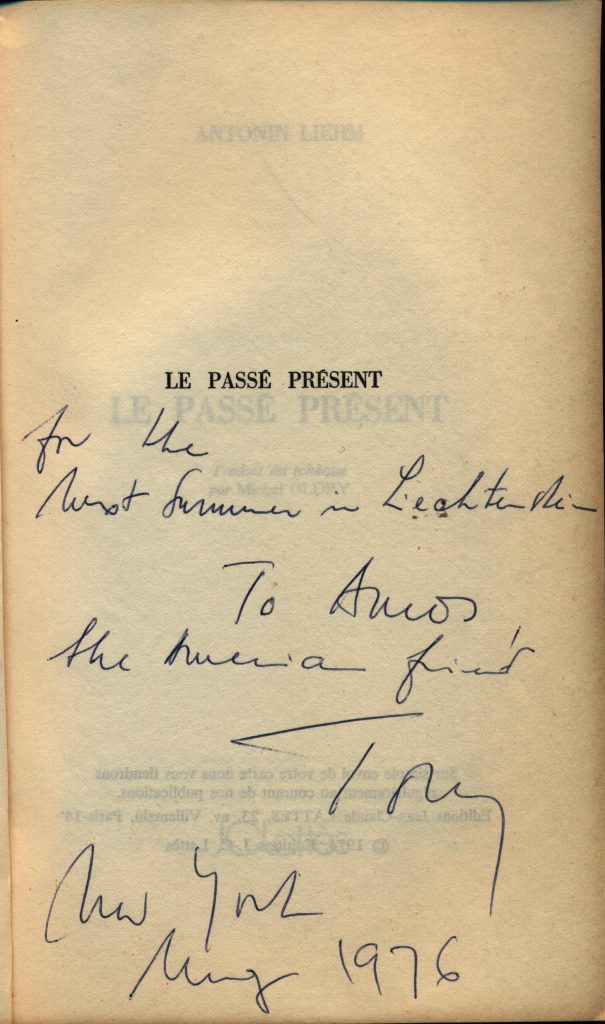Tom Waibel
„Im letzten Sommer in Liechtenstein“ lautet die Widmung, die Antonin Liehm (1924–2020) an Amos Vogel, „den amerikanischen Freund“ 1976 in seinen Essay Der östliche Sozialismus im Angesicht der modernen Welt schreibt.
Amos Vogel und Antonin Liehm verbindet mehr als ihr unbeirrbares Interesse am subversiven Potential des Films und die Forderung nach einem Kino als Instrument von Sozialkritik und neuer Ausdrucksmittel. Die gemeinsamen Freunde Erika und Ulrich Gregor bringen den großen Zusammenklang der beiden in ihrem Nachruf an Liehm so zum Ausdruck: „Die immer noch bestehende Hoffnung auf das ‚Unmögliche‘ bildete so etwas wie eine gemeinsame Plattform zwischen uns.“
Antonin Liehm war einer der Initiatoren des Prager Frühlings von 1968, und nach der sowjetischen Invasion ein bedeutender Exponent der Opposition im Exil. Der spätere tschechische Staatspräsident Václav Klaus sagt über ihn: „Er war eine der Schlüsselpersönlichkeiten der 1960er Jahre, einer von denen, die die berühmten Literární noviny (Literaturzeitung) schufen und lange Jahre prägten. Auch an der Schaffung der berühmten Neuen Welle des tschechischen Films der Sechziger Jahre war er beteiligt mit seinen Filmkritiken, die uns an diese Filme ‚heranführten‘.“
1974, in demselben Jahr, in dem Amos Vogel sein bahnbrechendes Kompendium Film as a subversive Art veröffentlicht, widmet ihm Antonin Liehm seine Studie der tschechoslowakischen neuen Welle Closely watched films mit den Worten: „and for Marcia + Amos this remembrance of things past.“
Später werden Vogel und Liehm aufgrund ihrer Lehrtätigkeit an der Pennsylvania University zu Arbeitskollegen, und als Liehm Mitte der 1980er Jahre in Paris die Zeitschrift Lettre internationale gründet und erfolgreich leitet, verfolgt Vogel diesen Versuch, ein transnationales „play of mirrors um einen Text herum zu erzeugen,“ aufmerksam. In der Amos Vogel Library finden sich neben den beiden bereits genannten und gewidmeten Büchern außerdem noch Antonin Liehms, The Most Important Art. East European Film After 1945, und The Politics of Culture sowie die Sammelbände Politics, Art and Commitment in the East European Cinema und Film and Censorship, beide mit Beiträgen Liehms.

“In the last Summer in Liechtenstein” reads the dedication Antonin Liehm (1924 – 2020) writes to Amos Vogel, “the American friend,” in his 1976 essay Eastern Socialism in the Face of the Modern World.
Amos Vogel and Antonin Liehm have more in common than their unwavering interest in the subversive potential of film and the demand for a cinema as an instrument of social criticism and new means of expression. In their obituary to Liehm, mutual friends Erika and Ulrich Gregor express the great resonance of the two in this way: “The ever-present hope for the ‘impossible’ formed something like a common platform between us.”
Antonin Liehm was one of the initiators of the Prague Spring of 1968, and after the Soviet invasion an important exponent of the opposition in exile. The future Czech President Václav Klaus said about him: “He was one of the key personalities of the 1960s, one of those who created the famous Literární noviny (Literary Newspaper) and shaped it for many years. He was also involved in the creation of the famous New Wave of Czech cinema of the sixties with his film reviews, which ‘introduced’ us to these films.”
In 1974, the same year that Amos Vogel published his groundbreaking compendium Film as a subversive Art, Antonin Liehm dedicated his study of the Czechoslovak new wave Closely watched films to him, noting, “and for Marcia + Amos this remembrance of things past.”
Later, Vogel and Liehm become working colleagues due to their teaching at Pennsylvania University, and when Liehm founded and successfully directed the journal Lettre internationale in Paris in the mid-1980s, Vogel closely followed this attempt to create a transnational “play of mirrors around a text.” In addition to the two books already mentioned and dedicated, the Amos Vogel Library also contains Antonin Liehm’s, The Most Important Art. East European Film After 1945, and The Politics of Culture, as well as the anthologies Politics, Art and Commitment in the East European Cinema and Film and Censorship, both with contributions by Liehm.